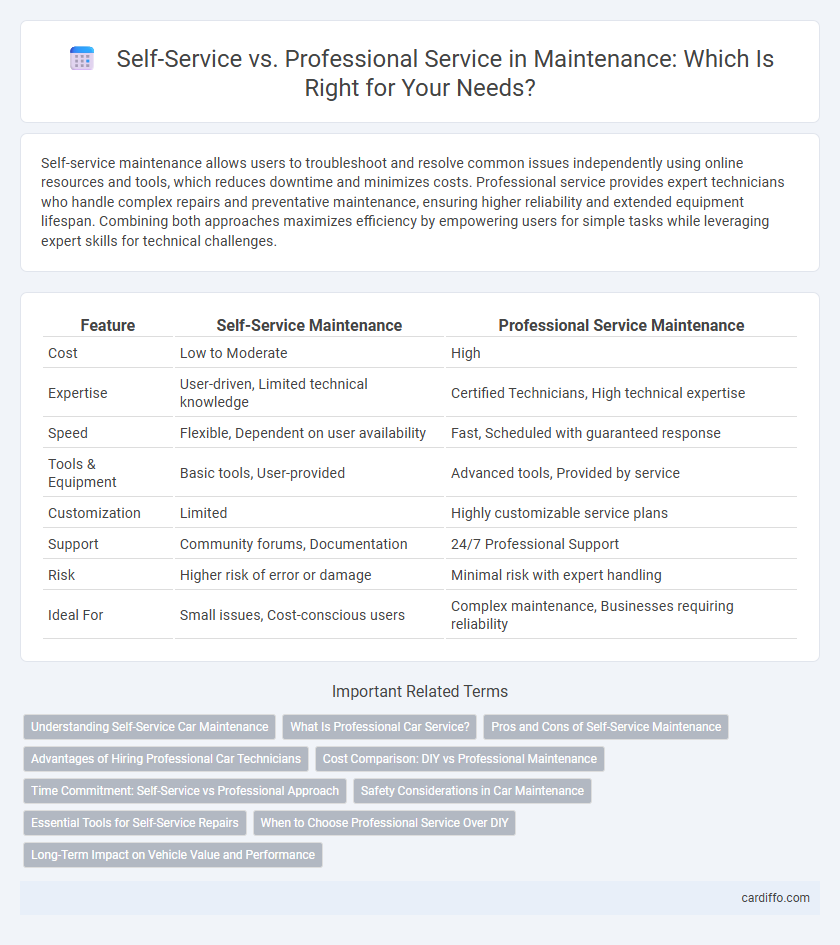Self-service maintenance allows users to troubleshoot and resolve common issues independently using online resources and tools, which reduces downtime and minimizes costs. Professional service provides expert technicians who handle complex repairs and preventative maintenance, ensuring higher reliability and extended equipment lifespan. Combining both approaches maximizes efficiency by empowering users for simple tasks while leveraging expert skills for technical challenges.
Table of Comparison
| Feature | Self-Service Maintenance | Professional Service Maintenance |
|---|---|---|
| Cost | Low to Moderate | High |
| Expertise | User-driven, Limited technical knowledge | Certified Technicians, High technical expertise |
| Speed | Flexible, Dependent on user availability | Fast, Scheduled with guaranteed response |
| Tools & Equipment | Basic tools, User-provided | Advanced tools, Provided by service |
| Customization | Limited | Highly customizable service plans |
| Support | Community forums, Documentation | 24/7 Professional Support |
| Risk | Higher risk of error or damage | Minimal risk with expert handling |
| Ideal For | Small issues, Cost-conscious users | Complex maintenance, Businesses requiring reliability |
Understanding Self-Service Car Maintenance
Self-service car maintenance empowers vehicle owners to perform routine tasks such as oil changes, tire rotations, and brake inspections using accessible tools and guided instructions. This approach reduces reliance on professional service centers, leading to cost savings and increased convenience while fostering greater understanding of vehicle mechanics. However, complex repairs and diagnostics still require expert intervention to ensure safety and proper functionality.
What Is Professional Car Service?
Professional car service involves expert technicians performing comprehensive maintenance and repairs using specialized tools and diagnostic equipment. This service ensures accurate identification of mechanical issues, adherence to manufacturer standards, and the use of high-quality replacement parts. Professional car service enhances vehicle performance, safety, and longevity through thorough inspections and preventive care.
Pros and Cons of Self-Service Maintenance
Self-service maintenance offers cost savings by reducing reliance on professional technicians and allows users to address routine issues quickly, enhancing operational uptime. However, it requires a certain level of technical knowledge and can lead to improper repairs or overlooked problems without expert guidance, potentially increasing long-term costs. While self-service provides convenience and control, complex or critical maintenance tasks often necessitate professional service to ensure safety and system reliability.
Advantages of Hiring Professional Car Technicians
Professional car technicians offer advanced diagnostics and repair skills that ensure precise maintenance and longevity of your vehicle. Their expertise in handling complex systems reduces the risk of errors common in self-service attempts, saving time and preventing costly damages. Access to specialized tools and manufacturer-approved procedures guarantees high-quality service and optimal vehicle performance.
Cost Comparison: DIY vs Professional Maintenance
Self-service maintenance typically reduces labor costs by allowing users to handle routine repairs and troubleshooting independently, often supported by online resources and manuals. Professional maintenance incurs higher expenses due to expert labor charges, specialized tools, and guaranteed quality assurance, but can prevent costly errors and extend equipment lifespan. Evaluating total cost of ownership reveals that while DIY minimizes upfront costs, professional service may offer better long-term value by reducing downtime and repair frequency.
Time Commitment: Self-Service vs Professional Approach
Self-service maintenance allows users to address issues on their own schedule, often resulting in faster issue resolution due to immediate access and no wait times for professionals. Professional service, while potentially more time-consuming due to scheduling and diagnostics, offers expert intervention that can prevent recurring problems and reduce long-term downtime. Choosing between self-service and professional maintenance depends on the complexity of the task and the user's available time commitment.
Safety Considerations in Car Maintenance
Self-service car maintenance allows vehicle owners to perform basic tasks like oil changes and tire pressure checks, but it requires strict adherence to safety protocols to prevent accidents and equipment damage. Professional service centers employ trained technicians who follow established safety standards, reducing risks associated with handling hazardous materials and complex mechanical systems. Prioritizing safety considerations, such as using proper tools, protective gear, and disposal methods, is critical whether maintenance is done independently or by professionals.
Essential Tools for Self-Service Repairs
Essential tools for self-service repairs include high-quality screwdrivers, multimeters, thermal paste, and ESD-safe mats, enabling precise diagnostics and component handling. Professional service often relies on advanced instruments like oscilloscopes and specialized diagnostic software, which are less accessible for DIY maintenance. Equipping users with reliable, user-friendly tools significantly improves the success rate of self-service repairs and reduces dependency on costly professional interventions.
When to Choose Professional Service Over DIY
Professional service is essential when maintenance tasks require specialized knowledge, complex diagnostics, or advanced tools that exceed typical DIY capabilities. Urgent repairs affecting critical systems or warranty-covered equipment often mandate expert intervention to ensure compliance and safety. Opting for professional service minimizes risks of costly errors and downtime, preserving asset longevity and operational efficiency.
Long-Term Impact on Vehicle Value and Performance
Routine self-service maintenance helps reduce immediate costs but may lead to inconsistent care, potentially diminishing vehicle value and performance over time. Professional service ensures precise diagnostics, genuine parts, and expert repairs, enhancing longevity and preserving resale value. Consistent professional maintenance records also boost buyer confidence, supporting higher long-term vehicle valuation.
Self-Service vs Professional Service Infographic

 cardiffo.com
cardiffo.com